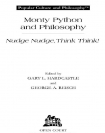Monty Python and Philosophy Gary Hardcastle (mystery books to read txt) 📖

- Author: Gary Hardcastle
Book online «Monty Python and Philosophy Gary Hardcastle (mystery books to read txt) 📖». Author Gary Hardcastle
No, to be sure. But laughter is weakness, corruption, the foolishness of our flesh. It is the peasant’s entertainment, the drunkard’s license. . . . laughter remains base, a defense for the simple, a mystery desecrated for the plebeians . . . laugh and enjoy your foul parodies of order, at the end of the meal, after you have drained jugs and flasks. Elect the king of fools, lose yourselves in the liturgy of the ass and the pig, play at performing your saturnalia head down. . . . But here, here [indicating Aristotle’s book] the function of laughter is reversed, it is elevated to art, the doors of the world of the learned are opened to it, it becomes the object of philosophy, and of perfidious theology. . . . [T]he church can deal with the heresy of the simple, who condemn themselves on their own…provided the act is not transformed into plan, provided this vulgar tongue does not find a Latin that translates it . . . in the feast of fools, the Devil also appears poor and foolish, and therefore controllable. But this book could teach that freeing oneself of the fear of the Devil is wisdom. . . . Look at the young monks who shamelessly read the buffoonery of the Coena Cypriani.38 What a diabolical transfiguration of the Holy Scripture! And yet as they read it they know it is evil. . . . The prudence of our fathers made its choice: if laughter is the delight of the plebeians, the license of the plebeians must be restrained and humiliated, and intimidated by sternness.39
Quite an un-British speech. This man clearly has no sense of humor. We see, now, why your soul is in such peril. You have been very naughty indeed. You shamelessly watched Monty Python’s Life of Brian just like one of those young monks, and you knew it was evil, not because it was funny, but because it unfolds according to the best principles of the comedic art. There is something very twisted about its being so good. So long as humor remains a mere ethnic joke of the working class told over too many beers, it can be tolerated, but raised to a standard of educated taste, even to the level of philosophy, it is more threatening to authorities, religious or political, in Jorge’s view. Such humor undermines the efforts of our serious “betters” to shepherd us toward order—unless of course (and this is what Jorge misses) those “betters” are Roman or British. If our “betters” are these psychotic Christians of the Falwell type, who cannot ever laugh at themselves, then yes, the comedy becomes a palpable threat as the humor becomes more intelligent. In the case of Monty Python’s Life of Brian, the better the film is at depicting the times of Christ, the more diabolical is the effect to pathetic followers of the dead God. Monty Python’s Life of Brian is, by the estimate of all the Pythons, their best film.40 Yet the British do not worry (much).41 How can this be sac-religious unless one has already taken the immortal soul too seriously?
Now let’s consider your soul. You apparently have two souls. The soul you know about is human, mortal (as far as you can tell), and inhabits this world, this life only. This is the soul which “animates” your physical existence, brings you to life, moves your body, fuels your consciousness. The immortal soul, if there is one, is a sort of sojourner in this world, it doesn’t much like your body (and if you look in the mirror I’m sure you’ll see the reasons), and frankly can’t wait to get the hell out of Dodge (or Hampstead, in fact, especially Hampstead). If these two souls are really the same, it isn’t obvious. So which soul is in peril? Must you lose one to save the other?
Getting Right with Brian (Just in Case)
There was a morose philosopher named Blaise Pascal (1623-1662) who, in spite of his dreary mood, can help you. We have seen the extent of your sin. You laughed. You may think this not your worst sin, but if so, you just aren’t listening. I almost think you must be British. Anyway, Pascal thought too much, way too much, and left behind his fragmentary putterings which were gathered together and published by still gloomier admirers, and that takes some doing. 42 One of these fragments received the number “233,” and contains what is called “Pascal’s Wager.” I won’t ruin your dinner with Pascal’s words, but I’ll adapt his wager to your current dilemma, according my own less moribund, er, umm . . . “idiom Sir?” Yes, that’s it, idiom; thank you Patsy.
So you know you have a finite soul. You also know that infinite things exist, like numbers. But here is a curiosity: “Infinity” is by definition a number, yet no one knows what it is, or much about it—for instance, whether it is odd or even. Yet, every number must be either odd or even. Don’t get your knickers in a twist. You don’t need to know, but you see it’s possible for you to know that something exists without knowing what it is. Your immortal soul is analogous. It may exist even if you don’t know what it is (and of course, the same for God, but never mind Him). And if you have an immortal soul, you have already wagered it: you laughed, not once but repeatedly during Monty Python’s Life of Brian. I firmly suspect you saw it more than once; you probably have the video somewhere, don’t you? You have wagered. Now what do you stand to lose and gain? If you have an immortal soul and the dead God isn’t





Comments (0)